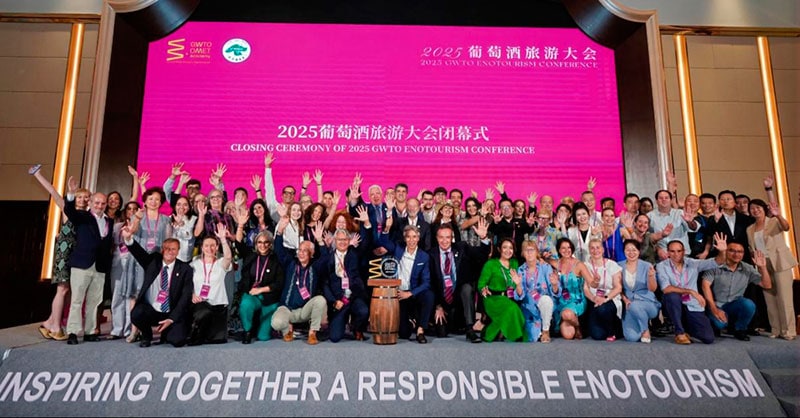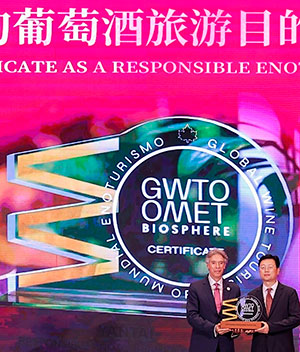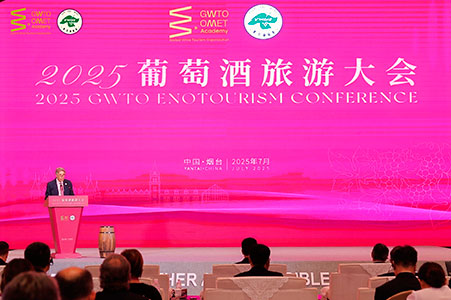ENG/ESP Press Release/Nota de Prensa. Yantai-Madrid.
From July 2 to 5, the city of Yantai (Peng Lai, Shandong) hosted the II GWTO Global Summit on Responsible Enotourism: ‘Inspiring Together a Responsible Enotourism’.
The Conference brought together delegates from 20 countries to immerse themselves in the unique charm of “Wonderland Coast + Wine” and discuss the development of the global enotourism industry.
Why has a Global Summit been held in Yantai? Yantai is the birthplace of wine in China and its integration with tourism attracts 3 million Chinese annually. The objective is internationalization with the support of GWTO.
At the Opening Ceremony, founder president and CEO José Antonio Vidal, on behalf of GWTO, highlighted the integration of the value chain for enotourism in Yantai and expressed gratitude to the authorities of the Yantai Municipality, the Peng Lai District, and Shandong Province, as well as to the university, the Yantai Vineyard and Wine Bureau, and the Yantai Enotourism Association, “for swiftly grasping the essence and scope of GWTO: positioning Yantai on the global enotourism map as a Responsible, Sustainable, and Fulfilling Destination for both tourists and residents”. He also acknowledged the GWTO China team, led by Jiang Jiawei (Director) and Gao Ruylene (Institutional Relations), as well as Oscar Fan and Dina Gimbatova, coordinators of the Yantai-GWTO teams, for their committed dedication.
“The support and contributions of GWTO will forever be engraved
in Yantai and Shandong’s history”
Dong Qing, Yantai News
In 1892 began the industrialization of Chinese wine in Yantai.
In 1987 Chinese wine arrived on the world stage from Yantai.
In 2025, with the GWTO Summit, Yantai shows the world its transformation model to boost the development of China’s enotourism industry.
At the end of 2024, Yantai took the lead in forming the alliance for the development of wine culture and tourism industry, coordinating resources and promoting the integration of the development of both industries, adopting a series of innovative practices: Advised and guided by OMET, the Yantai Wine Tourism Association was formed, presenting in Europe to participate from February 3 to 5, 2025 in the International Wine Tourism Forum, within the fifth Barcelona Wine Week; During the Global Summit, Yantai Vocational College of Culture and Tourism YVCCT and GWTO signed a cooperation agreement to establish the physical headquarters of GWTO Academy. The Yantai school will deeply introduce global standards and resources, cultivating international talents.
The Opening Ceremony was attended by the highest local institutional authorities and, from the GWTO side, remarkable figures such are Rafael Ansón, GWTO President of Honor and the International (Paris) and Ibero-American (Madrid) Gastronomy Academies; Harry Theoharis, Greece’s Deputy Minister of Foreign Affairs, finalist candidate for the UN Tourism Secretary-General for 2026-2029, and former Minister of Tourism of Greece; Gabriela Testa, Minister of Tourism of Mendoza, Argentina; Alejandra Cabrera, representing Uruguay’s Ministry of Tourism (host country of the I GWTO Global Summit 2024).
The inaugural technical presentation were delivered by José Antonio Vidal on ‘Positioning wine regions on the global map of Responsible Enotourism Destinations’ through the five GWTO pillars: professionalization by GWTO Academy, promotion via GWTO MICE, international recognition through the GWTO-Biosphere Certification for Responsible Enotourism Destinations and Establishments, commercialization of experiences via the EWC EnoWineClub ‘More Than Wines’ booking platform, and data-driven decision-making through the GWTO Global Enotourism Economic Monitor.
GWTO: The United Nations of Responsible Enotourism

As articulated by GWTO’s President, “Enotourism is a transversal activity that serves as a cohesive force, connecting tourists, regions, wineries, gastronomy, cultural heritage, and nature, thereby embodying the concept of globalization and fostering solidarity while reinforcing the identity of each destination.”
Delegates from twenty countries -transcending political interests- gathered in Yantai, a prestigious city in China’s Shandong Province, one of the nation’s most prominent urban centers. Participants included representatives from the United States, Russia, and host country China, alongside winery owners, destination managers, distributors, international tour operators, media, national and international decision-makers, academic authorities, and top-tier consultants.
These stakeholders convened around GWTO in Yantai to advance the organization’s mission.
International Certification

GWTO awarded Yantai with the GWTO Biosphere International Certificate as a ‘Responsible Enotourism Destination’, recognized for its sustainable responsible practices and ability to provide fulfilling experiences for both visitors and residents.
Peng Lai district was recognized as an “International Coastal Enotourism Destination”.
Technical sessions
Planning, rigor, training, commitment, loyalty, innovation, responsibility, value, quality, inclusion, challenges, opportunities, reflections at all times present and oriented to the double satisfaction of the tourist and the resident.
As Vidal noted, “Wine is not only a cultural ambassador symbolizing friendship but also a liquid sustenance (the beverage) that, alongside solid sustenance (food), constitutes gastronomy (and viceversa)”.
During the Conference these topics were discussed: the value of the Responsible aspect reflected in the ROI; the opportunities that events offer to enotourism establishments; intelligent communication; economic indicators as a tool for better decision making; and the value of OMET Academy as a venue for enotourism knowledge.
All delegates had the opportunity to visit the ancient wonders of the Peng Lai district and the most emblematic winery-châteaux of the Yantai enotourism destination.
GWTO Academy venues
Six educational institutions were introduced with which GWTO has reached agreements to open their physical locations: Yantai Vocational College of Culture and Tourism YVCCT, Ningxia Helan Mountain-Dulaan, Universidad Nacional de Cuyo (Mendoza, Argentina), Chamber of Commerce of Ciudad Real (Spain), IGES Universidad (Querétaro, Mexico) and Universidad Villa María (Córdoba, Argentina).
Acknowledgements and Awards
Represented by their founders and presidents, the Enotourism Associations of Yantai, Spain AEE, Portugal APENO, Armenia ECoA, Romania, Argentina COVIAR, Uruguay INAVI and Chile BIOBIO, were recognized for their vocation in the integration of the value chain to improve the responsible socioeconomic development of wine tourism destinations.
The finalists for Best Responsible Foreign Experience received diplomas: Cantina Tre Secoli SCA (Italy), Torre de Palma (Portugal), Bodega Catena Zapata (Argentina) and Bodega La Abeja (Argentina).
The GWTO Award for Best Responsible Foreign Experience went to Abrau-Durso Group (Russia) for its commitment to Eco, Eno and Ethos.
Diplomas were also awarded to the national Wineries-Châteaux for their Responsible Experiences: ChangYu, Junding, Long Ting, Mystic Island, Runaway Cow, Yuanshi and Dulaan.
International enotourism destinations Yantai (China), Alentejo (Portugal), Mendoza (Argentina), Querétaro (Mexico), Penedés (Spain) and Valle de Biobío (Chile) were recognized for their support from the public sector to the private sector.
Announcement of the 2026 GWTO Summit Host Destination

As a final act, the destination that will host the GWTO 2026 Global Summit was presented: Alentejo (Portugal).
“Thank you all for answering the call of Responsible Enotourism, the industry of happiness, and for becoming part of the international GWTO Enotourism family,” concluded José Antonio Vidal.
ABOUT YANTAI’S WINE AND ENOTOURISM
Since the establishment of Zhangyu Wine Company in 1892, Yantai Wine Region has experienced 133 years of development, gathered 204 wine enterprises, 63 well-known wineries, forming three major sub-regions: Mountain Valley, Liulin River Valley, Pula Valley.
For nine consecutive years Yantai ranked first in China’s wine industry. Facing the current downward trend of the wine industry, Yantai promotes the innovative development of the wine industry, through a strong foundation in Tourism by integrating the value chain.
The Chu Valley gathers a series of boutique wineries becoming a flag for the development of “wine and travel integration” in the city. The “One Belt, Three Valleys” enotourism road in Penglai district has successfully been included in China’s first enotourism route. In the Chu valley, there is Lafite-Rothschild’s only winery in Asia. Since its establishment tens of thousands of people visit every year to experience the charm of a world-class winery.
The responsible and sustainable development practices of Chinese enotourism over time offer important lessons in terms of integrating enotourism with existing rural tourism resources, rather than isolated development. True responsible and sustainable development must be based on local realities and find a balance through multi-stakeholder dialogue, which is the core value of the Chinese model.
Conclusiones II Cumbre Mundial OMET
Del 2 al 5 de julio se ha celebrado en la ciudad china de Yantai (Peng Lai, Shandong), la II Cumbre Global OMET del Enoturismo Responsable: ‘Inspirando Juntos un Enoturismo Responsable’.
La Conferencia reunió a delegados de 20 países para sumergirse en el encanto único de «Wonderland Coast + Wine» e intercambiar conocimiento sobre el desarrollo de la industria enoturística mundial.
¿Por qué se ha celebrado en Yantai una Cumbre Global? Yantai es la cuna del vino de China y su integración con el turismo hace que atraiga anualmente a 3 millones de chinos. El objetivo es la internacionalización con el apoyo de OMET.
En la Ceremonia de Bienvenida, en nombre de OMET, su fundador, presidente y CEO José Antonio Vidal,puso de manifiesto la integración de la cadena de valor a favor del Enoturismo de Yantai y agradeció ” a las autoridades de la municipalidad de Yantai, del Distrito Peng Lai y de la provincia de Shandong, a la universidad, al Bureau de la Viña y el Vino de Yantai, y a la Asociación de Enoturismo de Yantai, por haber captado rápidamente la esencia y el alcance de OMET: posicionar a Yantai en el mapa mundial del enoturismo como un Destino Responsable, Sostenible y Satisfactorio para los turistas y para los residentes en Yantai”.
De igual modo, hizo propio con el equipo de OMET para China, formado por Jiang Jiawei y Gao Ruylene, Directora y responsable de Relaciones Institucionales, respectivamente, y a Oscar Fan y a Dina Gimbatova, como coordinadores de los equipos de Yantai y de OMET.

“El apoyo y las contribuciones de OMET quedarán grabadas para siempre
en la historia de Yantai y de Shandong”
Dong Qing, Yantai News
En 1892 comenzó en Tantai la industrialización del vino chino.
En 1987, el vino chino llegó a la escena mundial desde Yantai.
En 2025, con la Cumbre de OMET, Yantai muestra al mundo su modelo de transformación para impulsar el desarrollo de la industria enoturística de China.
A finales de 2024, Yantai asumió el liderazgo en la formación de la alianza para el desarrollo de la industria de la cultura del vino y el turismo, coordinando recursos y promoviendo la integración del desarrollo de ambas industrias, adoptando una serie de prácticas innovadoras: Asesorados y guiados por OMET se formó la Asociación de Enoturismo de Yantai, presentándose en Europa para participar del 3 al 5 de febrero de 2025 en el Foro Internacional de Enoturismo, dentro de la quinta Semana del Vino de Barcelona; Durante la Cumbre Mundial, Yantai Vocational College de Cultura y Turismo y GWTO firmaron un acuerdo de cooperación para establecer la sede física de GWTO Academy. La escuela de Yantai introducirá en profundidad los estándares y recursos globales, cultivando talentos internacionales.
En la Ceremonia de Apertura participaron las más altas autoridades institucionales locales. Por parte de OMET hicieron uso de la palabra: Rafael Ansón, OMET Presidente de Honor y de las Academias de Gastronomía Internacional (París) e Iberoamericana (Madrid); Harry Theoharis, Viceministro de Asuntos Exteriores de Grecia, candidato finalista a la Secretaria General de ONU Turismo para 2026-2029 y ex Ministro de Turismo de Grecia; Gabriela Testa, Ministra de Turismo de Mendoza (Argentina); Alejandra Cabrera, representando al Ministerio de Turismo de Uruguay (país sede de la 1ª Cumbre Mundial de OMET 2024)..
La ponencia técnica inaugural corrió a cargo de José Antonio Vidal, sobre ‘Posicionando las regiones vitivinícolas en el mapa mundial de destinos enoturísticos Responsables’, por medio de las cinco áreas clave de actuación de OMET: la profesionalización a través de OMET Academy, la promoción a través de OMET MICE, el reconocimiento internacional a través de la Certificación OMET Biosphere como Destinos y Establecimientos Enoturísticos Responsables, la comercialización de las experiencias a través de la plataforma de reservas EWC EnoWineClub ‘Más que Vinos’, y la herramienta de gestión para la toma de decisiones a través del OMET Monitor Económico del enoturismo mundial.
OMET: Las Naciones Unidas del Enoturismo Responsable

“El enoturismo es una actividad transversal -así lo ha expresado José Antonio Vidal-, que se abre como un elemento cohesionador, relacionando gobiernos, destinos, universidades, turistas y residentes, a través de los patrimonios de la gastronomía, de la cultura en su más amplia acepción y de naturaleza, reconociéndose las identidades locales entre todos los actores”.
Delegados de veinte países de un sector enoturístico que trasciende los intereses políticos -hermanando a representantes de EEUU, de Rusia y de China como anfitrión-, se dieron cita en torno a OMET en Yantai.
Certificación Internacional

El destino Yantai fue reconocido con la Certificación Internacional OMET Biosphere como Destino Enoturístico Responsable en sus buenas prácticas, Sostenible en el tiempo y Satisfactorio para visitantes y residentes, convirtiendo a Yantai en un referente mundial enoturístico, posicionándose en los mercados globales.
El distrito Peng Lai fue reconocido por OMET como «Destino Internacional de Enoturismo de Costa».
Sesiones técnicas
Planificación, rigor, formación, compromiso, lealtad, innovación, responsabilidad, valor, calidad, inclusión, retos, oportunidades, reflexiones en todo momento presentes y orientadas a la doble satisfacción del turista y del residente: “No en vano, el vino es un embajador cultural que supone amistad; y un alimento, líquido (la bebida), que junto al sólido (la comida), conforma la gastronomía”, señaló Vidal.
Durante la Conferencia se habló del valor de lo Responsable reflejado en el ROI; de las oportunidades que ofrecen los eventos a los establecimientos enoturísticos; de la comunicación inteligente; de los indicadores económicos como instrumento para la mejor toma de decisiones, y del valor de OMET Academy como sede del conocimiento enoturístico.
Todos los delegados tuvieron la oportunidad de visitar las maravillas ancestrales del distrito Peng Lai y las Bodegas-Châteaux más emblemáticas del destino enoturístico Yantai
Sedes de OMET Academy
Se presentaron seis instituciones educativas con las que OMET ha llegado a acuerdos para aperturar sedes físicas: Yantai Vocational College of Culture and Tourism YVCCT, Ningxia Dulaan-Helan Mountain, Universidad Nacional de Cuyo (Mendoza, Argentina), Cámara de Comercio de Ciudad Real (España), IGES Universidad (Querétaro, México) y Universidad Villa María (Córdoba, Argentina).
Reconocimientos y Premios
Representadas por sus fundadores y presidentes, las Asociaciones de Enoturismo de Yantai, de España AEE, de Portugal APENO, de Armenia ECoA, de Romania, de Argentina COVIAR, de Uruguay INAVI y de Chile BIOBIO, fueron reconocidas por su vocación en la integración de la cadena de valor para mejorar el desarrollo socioeconómico responsable de los destinos enoturísticos.
Recibieron Diploma las bodegas finalistas a la Mejor Experiencia Responsable extranjera: Cantina Tre Secoli SCA (Italy), Torre de Palma (Portugal), Bodega Catena Zapata (Argentina) y Bodega La Abeja (Argentina).
El Premio OMET a la Mejor Experiencia Responsable extranjera recayó en Abrau-Durso Group (Rusia) por su compromiso Eco, Eno y Ethos.
También recibieron Diplomas las Bodegas-Châteaux nacionales por sus Experiencias Responsables: ChangYu, Junding, Long Ting, Mystic Island, Runaway Cow, Yuanshi y Dulaan.
Los Destinos Enoturísticos internacionales Yantai (China), Alentejo (Portugal), Mendoza (Argentina), Querétaro (México), Penedés (España) y Valle de Biobío (Chile), fueron reconocidos por el apoyo del sector público al sector privado.
Anuncio de la sede de la Cumbre OMET 2026

Como acto final se presentó el destino que acogerá la Cumbre Mundial OMET 2026: Alentejo (Portugal).
“Gracias a todos por acudir a la llamada del Enoturismo Responsable, de la industria de la felicidad, formando así parte de la familia enoturística internacional OMET”, concluyó José Antonio Vidal.
SOBRE EL VINO Y EL ENOTURISMO DE YANTAI
Desde la fundación de la Compañía Vinícola Zhangyu en 1892, la Región Vinícola de Yantai ha experimentado 133 años de desarrollo, reuniendo 204 empresas vinícolas, 63 bodegas de renombre, formando tres grandes subregiones: Valle de las Montañas, Valle del Río Liulin y Valle de Pula.
Durante nueve años consecutivos Yantai ocupa el primer lugar en el vino de China. Frente a la actual tendencia a la baja de la industria del vino, Yantai promueve el desarrollo innovador de la industria del vino, a través de una base fuerte en Turismo mediante la integración de la cadena de valor.
El valle de Chu reúne una serie de bodegas boutique que se han convertido en una bandera para el desarrollo de la «integración del vino y los viajes» en la ciudad. La ruta enoturística «Un cinturón, tres valles» del distrito de Peng Lai se ha incluido con éxito en la primera ruta enoturística de China. En el valle de Chu se encuentra la única bodega de Lafite-Rothschild en Asia. Desde su creación decenas de miles de personas la visitan cada año para experimentar el encanto de una bodega de categoría mundial.
Las prácticas de desarrollo responsable y sostenible en el tiempo del enoturismo chino, ofrecen importantes lecciones en cuanto a la integración del enoturismo con los recursos turísticos rurales existentes, en lugar de un desarrollo aislado. El verdadero desarrollo responsable y sostenible debe basarse en las realidades locales y encontrar un equilibrio a través del diálogo multipartito, que es el valor fundamental del modelo chino.